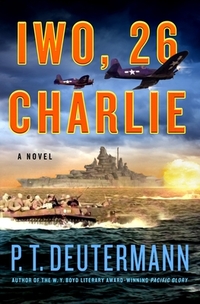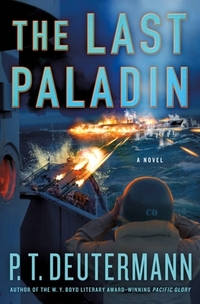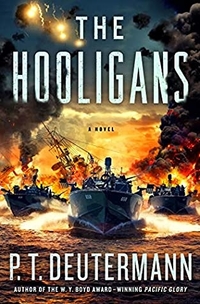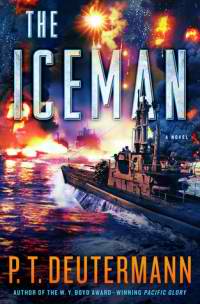Iwo, 26 Charlie by P.T. Deutermann
 Monday, November 27, 2023 at 6:56AM
Monday, November 27, 2023 at 6:56AM 
Published by St. Martin's Press on November 28, 2023
P.T. Deutermann’s recent novels have been working their way through the Pacific War. This one showcases the Battle of Iwo Jima in 1945. The protagonist is Lee Bishop, a naval lieutenant assigned to a destroyer. His job is to communicate with spotters on the island and to translate the coordinates they provide into firing solutions. Being the military, information provided by spotters goes through layers of bureaucracy before orders to fire are finally given. The delay endangers Marines who need immediate support. Bishop comes up with a plan to replace multiple competing grids with a single grid. The plan will streamline the process and save American lives.
Unfortunately for Bishop, he is sent to Iwo Jima to explain and test his plan. He’s given the job of a spotter, a job that most Marines don’t survive for more than 24 hours before a sniper puts an end to their spotting. Three Marines who have become known as the Goon Squad are assigned to keep him alive. Bishop is a mere naval lieutenant and not a Marine, but they bond anyway. Bonding becomes easier after they repeatedly save each other’s lives.
Bishop proves that his idea is effective. It’s so effective that he’s repeatedly sent into the field on new missions. He saves countless lives by calling in strikes on Japanese positions, devising ways to get the right shells to land on the right targets.
The missions are harrowing. Nobody writes combat scenes with more voltage than Deutermann. If it is improbable that one man can do as much damage as Bishop causes, Deutermann sold me on believing in the possibility of unlikely heroism.
It’s amusing that Bishop reviles the Japanese because they use sneaky tactics and fight to the death as he finds sneaky ways to outfight the Japanese and praises Marines for fighting to the death. Such is the logic of war. I can’t fault Deutermann for portraying that logic as it appears to combatants.
Apart from holding widely shared opinions (like other soldiers and sailors in Deutermann’s recent novels, Bishop hates everything about the Japanese), Bishop doesn’t have much of a personality. He’s dutiful and friendly and brave, but he isn’t developed with the same depth as the protagonists in some of Deutermann’s other novels. To the extent that his personality comes through, Bishop reveals it in an epilog when we learn that he has not gotten over the trauma he endured on Iwo Jima. The epilog is genuinely moving. It also takes an honest look at the difficult cost-benefit value of crippling three divisions of Marines to capture a single island.
Even if Bishop is a bit bland, this novel doesn’t need to rely on characterization for its success. Deutermann excels at bringing the reader into a battlefield. The carnage of war, the relentless fear that an attack is imminent, the hope of survival, the odor of fuel and sweat and decaying bodies (and sulfur in the case of Iwo Jima), the deafening noise of artillery, all contribute to growing tension as the reader follows Bishop and hopes that, against all odds, he will complete his missions and survive intact. I don’t go out of my way to read war novels, but I am never disappointed by P.T. Deutermann’s stories about World War II.
RECOMMENDED


